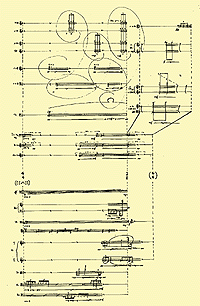
Peter
Hübner
Curse or blessing: yes
Page of the score
from the opera
JOURNALIST:
In your work for the stage “Curse or blessing: yes” you present
the fundamental stages of these developments on stage as the manifestations
of Kchatom’s inner ideas and contemplations. And in the end, he finds
himself – awakening from his dreamy thoughts – in today’s
Christian times, as the eternal “degenerated” revolutionary.
And hardly has he publicly spoken about his visions of the unethical situation
in the world, when he is excluded from church by the Christian institution.
PETER HÜBNER: In our present times,
the church cannot simply kill an independently thinking person or chase
him away, today it can only denigrate such a person in public, and only
run away from him into the shelter of its ecclesiastical buildings and fenced
off land holdings.
JOURNALIST: The church’s offering
to Kchatom to devoutly join the parish, go to church, and to suffocate his
free thoughts in the routine of religious celebrations, are rejected by
him.
PETER HÜBNER: Yes, he has become
aware of and has experienced too many things to be able to turn back.
And so he once again thinks
over all his previous experiences right from the beginning – in this
case, everything he has experienced on stage as a member of the audience,
but what in reality has developed out of his mind’s eye in his own
imagination: the creation of the world through the word and the devil’s
hand, as well as the observance of his laws through the ambitious leaders
of society during the different times, and the application of his laws for
the education of new generations: the consistent guide of the entire world
to the process of self-destruction, to individual, social and ecological
crises which lead plants, animals and humans alike to the edge of an existential
abyss.
JOURNALIST: During the new re-capitulation of this whole idea
of the world, two great scenes in his life crystallise out of Kchatom’s
mind’s eye.
He recognises himself in the role of Sysiphus as he, again and again with
the greatest effort, heaves himself up the enormous colossus of his endeavour,
the high mountain of evolution, and how all troubles slip from his hands,
as he ages, dies and resigns, before he reaches the peak of his human striving
– and this again and again.
And he sees himself in the role of Diogenes, as he – beyond all such
fruitless efforts – sits in his cave at the foot of the mountain of
his evolution which he cannot climb by his own efforts, and does not care
at all about these Sysiphus endeavours.
© AAR EDITION INTERNATIONAL 2000